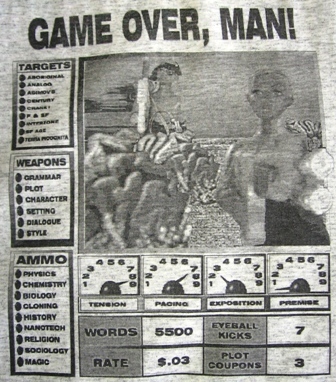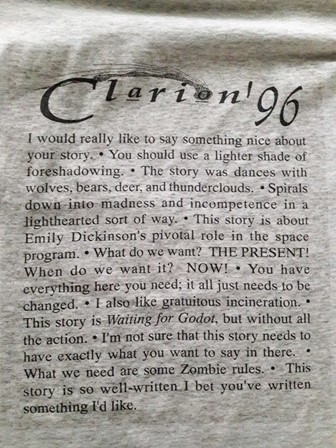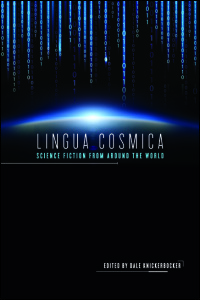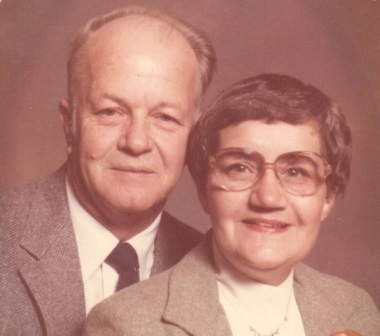Sue Burke's Blog, page 42
July 4, 2018
2U Salon open mic on Saturday
 I’ll be taking part in the 2U Salon, an open mic, on Saturday, July 3, from 7 to 9 p.m., at Second Unitarian Church, 656 W. Barry Ave., Chicago.
I’ll be taking part in the 2U Salon, an open mic, on Saturday, July 3, from 7 to 9 p.m., at Second Unitarian Church, 656 W. Barry Ave., Chicago.I’ll read a short essay about how much money Miguel de Cervantes made from Don Quixote. (Not much, alas.)
It’s free and open to all, with light snacks provided. BYOB. Expect readings, music, spoken word, and dance. Visual or other artists are invited to do a “show and tell” and display their works. Drop in, enjoy, and share your talent. No registration necessary. It’s the church I attend, and we welcome everyone.
— Sue Burke
Published on July 04, 2018 07:46
June 27, 2018
Hugo Awards 2018: my votes for the short stories
It’s Hugo Award voting time, and I’ve read and weighed the short stories. This year there are no incursions from Puppies of any kind, and while for aesthetic reasons I’m not fond of every nominee, they all deserve to be considered the year’s best. In fact, many of the Hugo short story nominations were also Nebula nominations.
In order from sixth to first place (the Hugo uses a ranked ballot), these are my votes for the short stories, but reasonable people might vote otherwise.
6. “Clearly Lettered in a Mostly Steady Hand,” by Fran Wilde (Uncanny 9-10/17)
A visitor is led through an exhibition of what might have once cruelly been called a freak show. Beautifully written, the story effectively evokes the bitter anger of those on display, and perhaps it’s meant as horror reflecting the way society treats those who are different, but I don’t think it quite fulfills the noble goals of horror. Horror stories are modern tragedies, and a tragedy requires the protagonists to suffer for some fault within themselves. The visitor is tortured apparently to avenge the general cruelty of society, but the visitor’s participation in this cruelty is never established. As Aristotle argued in Poetics, unmerited misfortune merely shocks us: it isn’t tragedy. I see this story as torture for torture’s sake, and there’s no merit in sadism. The quality of the writing, though, deserves to be ranked above “No Vote.”
5. “Carnival Nine,” Caroline M. Yoachim (Beneath Ceaseless Skies 5/11/17)
A wind-up toy robot mother makes great sacrifices to care for her robot son who has mechanical problems. The tale is obviously a analogy to what happens in real life to families with children with disabilities — a bit too obvious an analogy, perhaps, almost a parable, and the story never explains who does the winding up or why some toys live in a closet. Heart-strings are tugged, but logic is stretched, and that weakened the overall effect for me. Also a Locus Award nominee.
4. “Moon, Sun, Dust,” by Ursula Vernon (Uncanny 5-6/17)
A farmer is bequeathed a magic sword by his grandmother on her deathbed. He has no use for a sword, magic or otherwise, however, and is quite content to go on growing potatoes. His humble candor carries the story, which is gently and delightfully charming. I rank it fourth only due to stiff competition. It’s well worth reading.
3. “The Martian Obelisk,” by Linda Nagata (Tor.com 7/19/17)
As Earth is dying from a long series of natural and human-made disasters, an old woman is directing robots on Mars to create a monument to outlast humanity. It may be a futile gesture, but there’s not much else to do — then something seems to be stirring on Mars. This quiet story depends on largely unstated emotions to carry it, and those emotions lurk like leviathans: sorrow, defeat, anger, pain, despair … and defiance. Despite its brevity, it made a long journey across my heart to do battle with dystopia. It won the 2018 Locus Award for Short Story.
2. “Welcome to Your Authentic Indian Experience™,” by Rebecca Roanhorse (Apex 8/17)
An Indian guide for cyberspace tourists offers Native American “Vision Quests” that are as authentically Indian as the Lucky Charms leprechaun is authentically Irish, but white people seem fine with that. Then a customer wants too much. Unrelenting cynicism about commercialization and stereotypes underlies this story’s muted fury. It’s already won an Apex Reader’s Choice Award, a Locus Award nomination, and this year’s Nebula Award. Well deserved.
1. “Fandom for Robots,” by Vina Jie-Min Prasad (Uncanny 9-10/17)
A sentient robot discovers an anime series about another sentient robot, Hyperwarp, and becomes a “hyper-big fan.” Then it discovers fanfiction and makes friends. This is as funny as it sounds but also touching as the robot, which has no emotions, responds in a pseudo-emotional way and becomes accepted as a human on the internet. Both fandom and technology are efficiently dissected with a loving, razor-sharp knife. It was a Locus Award nominee and got my vote for the Nebula Award.
Good luck and congratulations to all the authors!
— Sue Burke
In order from sixth to first place (the Hugo uses a ranked ballot), these are my votes for the short stories, but reasonable people might vote otherwise.
6. “Clearly Lettered in a Mostly Steady Hand,” by Fran Wilde (Uncanny 9-10/17)
A visitor is led through an exhibition of what might have once cruelly been called a freak show. Beautifully written, the story effectively evokes the bitter anger of those on display, and perhaps it’s meant as horror reflecting the way society treats those who are different, but I don’t think it quite fulfills the noble goals of horror. Horror stories are modern tragedies, and a tragedy requires the protagonists to suffer for some fault within themselves. The visitor is tortured apparently to avenge the general cruelty of society, but the visitor’s participation in this cruelty is never established. As Aristotle argued in Poetics, unmerited misfortune merely shocks us: it isn’t tragedy. I see this story as torture for torture’s sake, and there’s no merit in sadism. The quality of the writing, though, deserves to be ranked above “No Vote.”
5. “Carnival Nine,” Caroline M. Yoachim (Beneath Ceaseless Skies 5/11/17)
A wind-up toy robot mother makes great sacrifices to care for her robot son who has mechanical problems. The tale is obviously a analogy to what happens in real life to families with children with disabilities — a bit too obvious an analogy, perhaps, almost a parable, and the story never explains who does the winding up or why some toys live in a closet. Heart-strings are tugged, but logic is stretched, and that weakened the overall effect for me. Also a Locus Award nominee.
4. “Moon, Sun, Dust,” by Ursula Vernon (Uncanny 5-6/17)
A farmer is bequeathed a magic sword by his grandmother on her deathbed. He has no use for a sword, magic or otherwise, however, and is quite content to go on growing potatoes. His humble candor carries the story, which is gently and delightfully charming. I rank it fourth only due to stiff competition. It’s well worth reading.
3. “The Martian Obelisk,” by Linda Nagata (Tor.com 7/19/17)
As Earth is dying from a long series of natural and human-made disasters, an old woman is directing robots on Mars to create a monument to outlast humanity. It may be a futile gesture, but there’s not much else to do — then something seems to be stirring on Mars. This quiet story depends on largely unstated emotions to carry it, and those emotions lurk like leviathans: sorrow, defeat, anger, pain, despair … and defiance. Despite its brevity, it made a long journey across my heart to do battle with dystopia. It won the 2018 Locus Award for Short Story.
2. “Welcome to Your Authentic Indian Experience™,” by Rebecca Roanhorse (Apex 8/17)
An Indian guide for cyberspace tourists offers Native American “Vision Quests” that are as authentically Indian as the Lucky Charms leprechaun is authentically Irish, but white people seem fine with that. Then a customer wants too much. Unrelenting cynicism about commercialization and stereotypes underlies this story’s muted fury. It’s already won an Apex Reader’s Choice Award, a Locus Award nomination, and this year’s Nebula Award. Well deserved.
1. “Fandom for Robots,” by Vina Jie-Min Prasad (Uncanny 9-10/17)
A sentient robot discovers an anime series about another sentient robot, Hyperwarp, and becomes a “hyper-big fan.” Then it discovers fanfiction and makes friends. This is as funny as it sounds but also touching as the robot, which has no emotions, responds in a pseudo-emotional way and becomes accepted as a human on the internet. Both fandom and technology are efficiently dissected with a loving, razor-sharp knife. It was a Locus Award nominee and got my vote for the Nebula Award.
Good luck and congratulations to all the authors!
— Sue Burke
Published on June 27, 2018 07:24
June 20, 2018
The Clarion T-shirt: cold, cruel critiques
 In 1996, when I was at the Clarion Science Fiction and Fantasy Writer’s Workshop, each class traditionally made a commemorative T-shirt. (This may still be the case. I hope so.)
In 1996, when I was at the Clarion Science Fiction and Fantasy Writer’s Workshop, each class traditionally made a commemorative T-shirt. (This may still be the case. I hope so.)Ours featured a design on the front evoking a video game. The boy mannikin in the illustration had certain sentimental significance.
The back, in keeping with tradition, listed remarks taken out of context from critiques. Critiquing stories was a main activity at the workshop, and we tried to be kind and helpful, but context is everything. One of these remarks was mine by the way, and I’m not going to own up to it. One of them was about a story I wrote, and it was actually good advice.
• I would really like to say something nice about your story.
• You should use a lighter shade of foreshadowing.
• The story was dances with wolves, bears, deer, and thunderclouds.
• Spirals down into madness and incompetence in a lighthearted sort of way.
• This story is about Emily Dickinson’s pivotal role in the space program.
• What do we want? THE PRESENT! When do we want it? NOW!
• You have everything you need; it all just needs to be changed.
• I also like gratuitous incineration.
• This story is Waiting for Godot, but without all the action.
• I'm not sure that this story needs to have exactly what you want to say in there.
• What we need are some Zombie rules.
 • This story is so well-written I bet you've written something I’d like.
• This story is so well-written I bet you've written something I’d like.— Sue Burke
Published on June 20, 2018 07:41
June 13, 2018
WisCon 42 report
 WisCon, the world’s leading feminist science fiction convention
WisCon, the world’s leading feminist science fiction conventionMay 25 to 28, 2018, Memorial Day weekend, Concourse Hotel, Madison, Wisconsin
Friday, May 25
Chicago to Madison
Since my husband needed our car to get to work, I hitched a ride with a friend to get from Chicago to Madison. At one point a detour for roadwork sent us on some gorgeous little country roads. We entertained ourselves by birdwatching, spotting lots of turkey vultures along with more elegant species.
We arrived a little after noon, and I checked in, got my credentials, and went to The Gathering, a fair-like welcoming event in the hotel’s Capitol Ballroom. It offered activities including a nail polish swap and hair braiding salon, but I mostly browsed through the clothing swap and found two sweaters, a dress, slacks, top, and scarf, at which point I decided to stop because my suitcase would be stuffed. Then I visited The Gathering’s Gadget Petting Zoo and marveled at the extensive variety of fidget spinners.
My only panel at the convention started at 2:30 p.m., Speculative Fiction in Translation, which I was also on last year at WisCon. We discussed the joys and obstacles (mostly financial) to translation, and some tricky cultural and linguistic challenges. I moderated, and the panel included Rachel Cordasco, who runs the Speculative Fiction in Translation website. She passed out a 14-page catalog of works recently translated into English from around the world; the information is available at her website. We also gave away chocolate and books, as we did last year.
Next stop: a Neopronouns workshop – words like “they,” “zhe,” “ze,” “xe,” “e” and “per.” As we discovered, even people who favor such pronouns sometimes find them awkward, and the grammar cases can be troublesome, but they serve an important purpose.
After dinner in the Con Suite, greeting old and new friends, I cruised through the Meet the Artists event in the Art Show and indeed met some artists. Then I attended “What Does It Mean to Be a Good Fandom Citizen?” which was about fanfic and creating an environment to support an attitude of “live and let live” (or “ship and let ship”; “to ship” refers to initiating a romantic relationship).
The hotel bar was well-stocked with Fantasy Factory, a beer by a local brewery, Karben4. The label depicts a fire-breathing unicorn being ridden by a ninja cat. I enjoyed it as I spent the rest of the evening at parties, laughing and getting a hug from a dragon, and was in bed by 1 a.m.
Saturday, May 26
Madison Concourse Hotel
Feeling better than I had a right to, I bought a coffee and a breakfast pastry as I toured the Farmer’s Market at Capitol Square near the hotel. Asparagus, morel mushrooms, and seedling flats served as proof of springtime. I bought some fine cheddar as a gift for my husband, who was stuck at home doing homework for his master’s degree.
I arrived a little late to “Alternatives to Patreon: Direct Support to Creators.” The discussion concluded that despite its flaws, there are few alternatives to Patreon, unfortunately.
I left the convention briefly to go to A Room of One’s Own bookshop to sign some of my books. I came back and bought some art, specifically a matted photo by Katie Clapham, whom I’d met the night before. Then I bought a book and trinkets in the Dealer’s Room, and finally I ate some tasty salads for lunch at the Con Suite.
“Subtle Dangers of AI” considered the biases in machine learning and algorithms, which are compounded by the tendency to use them to make money rather than practice any sort of ethics. At “Arab-American Fantasy,” guest of honor Saladin Ahmed told how he incorporated the importance of older people in Arab culture into his novel Throne of the Crescent Moon . “Female Friendships in Our Stories” compared the differences between friendships, romantic relationships, and familial ties, and discussed female friendships in specific works.
After dinner at a Peruvian restaurant with an old friend where we argued over familial ties in novels, I was back for the Tiptree Auction. Auctioneer Sumana “brainwane” Harihareswara, a stand-up comedian among other career choices, was surprised by some of the bidding. A red plastic inflatable fish skeleton was sold for $145. “I’m exceedingly aware that this is ridiculous,” she said as bidding escalated “for a thing you never needed ... this goddam fish ... that I got helping a friend move” because the friend was going to discard it. The winning bidder received a standing ovation.
Next, to Sumana’s greater amazement, a 2002 O’Reilly manual, Essential Blogging , Cory Doctorow’s first book, sold for even more, $355, despite its discussion of highly out-of-date technology. Perhaps the proximity to the temporary bar in the hallway had something to do with all this.
After that, I wandered through parties, including the Haiku Earring Party, where you select a pair of earrings, then the hostess, Elise Matthesen, gives you a topic, and you write a haiku. My earrings were made of large gray and black beads, and my topic was “mixing up the night.” After overcoming writer’s block, I produced: “about to ignite / hydrogen coalescing / into primal stars.”
That night, I conscientiously went to bed before midnight.
Sunday, May 27
Madison Concourse Hotel
Wearing my new earrings, which matched my outfit perfectly, I snatched some coffee and Racine kringle pastry at the Con Suite, then attended various panels. “How Writers, Editors, Teachers, and Publishers Can Encourage Positive Social Action” talked about “changing the shape of the box rather than the shape of the writer” and how to subvert narratives. “Epigenetics Book Club: What It Is and How It Will Affect SF Plotting” dealt with themes I am plotting about in my current writing project.
After lunch with a friend at a breakfast-all-day restaurant, the panel on “Uncommodifying Culture” pondered whether speculative fiction might be more branded and commodified than other genres. The panel “Biology Breaks Binaries: More Wild Alien Sex” was cancelled, so instead I went to “Constellations of This and Other Worlds.” The presenters couldn’t get the AV equipment to work, so we used our smart phones to access the star charts on their Google Drive document.
Next I went to a nearby coffee shop for “The Alchemy of Diversity: Poetry Open Mic,” where the Science Fiction and Fantasy Poetry Association celebrated its 40th anniversary; I am a member. We entertained ourselves with round-robin readings.
At the Dessert Salon, held immediately prior to the guest of honor speeches, we all got a choice of two desserts, and I went for maximum chocolate. As the event began, we were saddened to learn that Gardner Dozois had died. Saladin Ahmed said how much he’d miss him, and then read his speech: “I hope we can feel like guests in each others stories.... How we mythologize matters.” The other guest of honor, Tananarive Due, told how Gardner had published her early works, and then described how science fiction, in particular Afro-futurism, can “weave the future today.... We need to help young readers imagine a better world.”
The Tiptree Award ceremony presented chocolate and other gifts to Virginia Bergin, author of the winning work, a British young adult novel Who Runs the World? which will be published in the US as The XY.
Then I attended some parties, but none of them had alcohol, so eventually I gravitated to the bar, met old and new friends, and suddenly it was 1 a.m.
Monday, May 27
Madison to Chicago
I got up, packed, checked my luggage with the front desk, got coffee and a sweet roll in the Con Suite, and went to panels.
“You Are (Probably) Not As Progressive As You Think” discouraged would-be allies from getting angry or confrontational on behalf of marginalized groups because that makes the marginalized group members seem angry and confrontational, even if they aren’t. “Future of Fiction Formats” considered works such as 17776 by Jon Bois, as well as the question that the “Alternatives to Patreon” panel also pondered: how to get paid. “There’s no magic way to get paid through crowdfunding,” panelist Alexandra Erin said, “but there’s no magic way to get paid for anything.”
The convention ended with The Signout in the Capitol Ballroom, where about thirty authors signed their books. I was one of them. The guests of honor got a lot of attention. I chatted with friends, had Naomi Kritzer sign a book for me, enjoyed snacks elegantly provided to authors by the convention (thank you!), but I only signed three books, two of which were not my own.
And having said goodbye, I got my suitcase from consignment, walked to the nearby University of Wisconsin campus, and soon caught a bus back to Chicago, reading the latest issue of Asimov’s magazine on the way.
Next year’s WisCon guests of honor will be G. Willow Wilson, author of the Hugo-winning Ms. Marvel comic, and Charlie Jane Anders, author of the Nebula-winning novel All the Birds in the Sky.
— Sue Burke
Published on June 13, 2018 07:57
June 11, 2018
I’ll be at the Milwaukee Public Library East Branch on Saturday for “Semiosis”
I’ll be at the East Branch of the Milwaukee Public Library at 2 p.m. Saturday, June 16, to talk about Semiosis. The library is at 2320 N. Cramer Street. Boswell Books will be on hand to sell copies of the novel.
I’ll read a short piece about whether your houseplants hate you. (Spoiler, they don’t. In fact, they’re very worried about you.) I’ll also read a brief excerpt from the sequel to Semiosis. Bring your questions! I’ll also sign books, and with any luck meet old and new friends. If I’ve never met you before, here’s your chance.
Milwaukee is where I was born and spent my first four decades of life, so coming back will be a return to my old stomping grounds. I’m excited to be coming home with so much to share.
— Sue Burke
I’ll read a short piece about whether your houseplants hate you. (Spoiler, they don’t. In fact, they’re very worried about you.) I’ll also read a brief excerpt from the sequel to Semiosis. Bring your questions! I’ll also sign books, and with any luck meet old and new friends. If I’ve never met you before, here’s your chance.
Milwaukee is where I was born and spent my first four decades of life, so coming back will be a return to my old stomping grounds. I’m excited to be coming home with so much to share.
— Sue Burke
Published on June 11, 2018 06:54
June 4, 2018
Review: “Lingua Cosmica”
 My review of Lingua Cosmica: Science Fiction From Around the World is posted at SFRevu.
My review of Lingua Cosmica: Science Fiction From Around the World is posted at SFRevu.This book of essays by the University of Illinois Press takes a scholarly look at important authors in eleven countries. Little information is available about international science fiction, and this book helps fill a sizable void.
— Sue Burke
Published on June 04, 2018 07:34
May 24, 2018
My post at Asimov’s blog
My essay “We Lost Control a Long Time Ago” is available for your reading pleasure at From Earth to the Stars, Asimov’s Science Fiction Magazine’s blog for authors and editors.
In my post, I discuss Barry N. Malzberg’s sometimes uncomfortable idea about what sets science fiction apart from “literary” fiction: external events matter more than individual self-realization. Literary fiction tends to focus on one kind of change, increased self-understanding and self-control, as a means to gain control of your life. Science fiction says that you might achieve self-realization, but technological change is and always has been out of control, and that change and our inability to control it matters more to our lives.
This is what makes science fiction a dangerous and plot-oriented kind of literature.
— Sue Burke
In my post, I discuss Barry N. Malzberg’s sometimes uncomfortable idea about what sets science fiction apart from “literary” fiction: external events matter more than individual self-realization. Literary fiction tends to focus on one kind of change, increased self-understanding and self-control, as a means to gain control of your life. Science fiction says that you might achieve self-realization, but technological change is and always has been out of control, and that change and our inability to control it matters more to our lives.
This is what makes science fiction a dangerous and plot-oriented kind of literature.
— Sue Burke
Published on May 24, 2018 08:02
May 23, 2018
I’ll be at WisCon this weekend
 I’ll be attending WisCon, a feminist science fiction and fantasy convention in Madison, Wisconsin, from May 25 to 28. I’ve been attending off and on since the 1990s, and it’s always a fun, exciting weekend.
I’ll be attending WisCon, a feminist science fiction and fantasy convention in Madison, Wisconsin, from May 25 to 28. I’ve been attending off and on since the 1990s, and it’s always a fun, exciting weekend.On Friday at 2:30 p.m., I’ll be on a panel for Speculative Fiction in Translation with Rachel S. Cordasco, Arrate Hidalgo, Crystal Huff, and S. Qiouyi Lu. Find out about the obstacles and joys of translation, the effect of the internet, and anecdotes about what’s hard to translate. We’ll also give out chocolate and M&Ms, translated books, and a catalog listing recently translated works.
On Sunday at 4 p.m, I’ll be at the Science Fiction and Fantasy Poetry Association 40th anniversary round robin reading.
On Monday at 11:30 a.m., I’ll be taking part in The SignOut, a autograph/chat session. Come say hello if you haven’t already. Wind down after the fun-filled long weekend. On Tuesday, we have to go back to work — fully charged with WisCon energy.
— Sue Burke
Published on May 23, 2018 07:10
May 21, 2018
“Semiosis” will have a sequel!
The contracts have been signed, the manuscript has been accepted, and the novel Semiosis will have a sequel. In it, Earth sends a mission to the planet Pax, and — no surprise — things don't go well, for a variety of reasons. Stevland is forced to act.
I’ve begun revisions with my editor at Tor, Jen Gunnels, who is a delight to work with. The novel should come out in 2019, and the title has yet to be decided. It’s been referred to as Semiosis: Pax, but in my computer, it’s just “Pax II.”
In addition, Tor wants to buy a third, unrelated book, and I’ve begun work on that. It will be about perfect human clones and their struggle to fit into an imperfect world. At this stage in the process, which is still the zero draft (not even close to a first draft yet), it’s hard to say more because I’m still exploring the story. It should be published around 2020.
I want to thank my agent, Jennie Goloboy at Donald Maass Literary Agency, for all her work to make this happen.
— Sue Burke
I’ve begun revisions with my editor at Tor, Jen Gunnels, who is a delight to work with. The novel should come out in 2019, and the title has yet to be decided. It’s been referred to as Semiosis: Pax, but in my computer, it’s just “Pax II.”
In addition, Tor wants to buy a third, unrelated book, and I’ve begun work on that. It will be about perfect human clones and their struggle to fit into an imperfect world. At this stage in the process, which is still the zero draft (not even close to a first draft yet), it’s hard to say more because I’m still exploring the story. It should be published around 2020.
I want to thank my agent, Jennie Goloboy at Donald Maass Literary Agency, for all her work to make this happen.
— Sue Burke
Published on May 21, 2018 07:26
May 13, 2018
Thanks, Mom. I was so sick...
My mother and father passed away more than two decades ago, but I want to thank them now for helping me at a time when I couldn’t say thank you.
 I was nine years old, and I got the measles. Back then, there was no vaccine. There were epidemics, and they were dreaded.
I was nine years old, and I got the measles. Back then, there was no vaccine. There were epidemics, and they were dreaded.
I have never been so sick before or since. I remember looking in the mirror, and the sight of my rash-covered face almost made me throw up. In fairness, I was throwing up a lot. And I had a fever, a very high fever.
One night, I woke up with fever-induced hallucinations. Worse yet, I had thrown up in my sleep. Vomit and hallucinations do not mix well, and I wish I could suppress that memory. I was terrified and had no way to help myself. Soon, though, my parents came and cleaned me up. In addition, as I recall (I was hallucinating), my favorite cartoon character appeared and said very comforting things to me. I still wonder who, if anyone, said that.
From there on, I began to recover. I was better at Thanksgiving, and I came down for dinner in my bathrobe and ate as much as I could, which wasn’t much. Mom even got my favorite vegetable, asparagus. I enjoyed it a lot, although I couldn’t eat even a single full stalk. I left the party before dessert was served and went back to bed, exhausted. I had reached my limit, and I climbed the stairs to my room bitterly disappointed that my limit was so low.
I don’t remember saying thank you to Mom and Dad for all they did when I was so ill. I didn’t fully understand what was happening at the time, and getting well might have been thanks enough, actually. Measles can cause lasting health problems or even death. A boy at my school died in that epidemic. Parents who don’t vaccinate their children may not understand how dire the disease can be.
So, Mom, thank you for helping me on that night when I was in so much trouble and utterly helpless and frightened. I still remember how thankful I felt to know you had come and would make it all better.
— Sue Burke
 I was nine years old, and I got the measles. Back then, there was no vaccine. There were epidemics, and they were dreaded.
I was nine years old, and I got the measles. Back then, there was no vaccine. There were epidemics, and they were dreaded.I have never been so sick before or since. I remember looking in the mirror, and the sight of my rash-covered face almost made me throw up. In fairness, I was throwing up a lot. And I had a fever, a very high fever.
One night, I woke up with fever-induced hallucinations. Worse yet, I had thrown up in my sleep. Vomit and hallucinations do not mix well, and I wish I could suppress that memory. I was terrified and had no way to help myself. Soon, though, my parents came and cleaned me up. In addition, as I recall (I was hallucinating), my favorite cartoon character appeared and said very comforting things to me. I still wonder who, if anyone, said that.
From there on, I began to recover. I was better at Thanksgiving, and I came down for dinner in my bathrobe and ate as much as I could, which wasn’t much. Mom even got my favorite vegetable, asparagus. I enjoyed it a lot, although I couldn’t eat even a single full stalk. I left the party before dessert was served and went back to bed, exhausted. I had reached my limit, and I climbed the stairs to my room bitterly disappointed that my limit was so low.
I don’t remember saying thank you to Mom and Dad for all they did when I was so ill. I didn’t fully understand what was happening at the time, and getting well might have been thanks enough, actually. Measles can cause lasting health problems or even death. A boy at my school died in that epidemic. Parents who don’t vaccinate their children may not understand how dire the disease can be.
So, Mom, thank you for helping me on that night when I was in so much trouble and utterly helpless and frightened. I still remember how thankful I felt to know you had come and would make it all better.
— Sue Burke
Published on May 13, 2018 04:40



